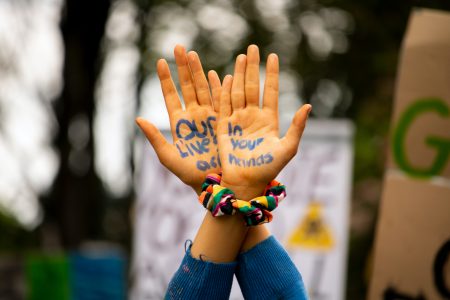I am writing this sharing while listening to the outcome of COP26 with mixed positive and negative feelings. I feel hope when seeing youths worldwide come together to wake the world leaders up for the urgency. I feel anxious, questioning: is this another greenwashing summit to give false hopes to the young ones and those who suffer from climate disaster?
This month, my email and social media are full of news about COP26 and climate change. I read through the news and participated in the related events. In fact, previously, there were many periods I shut off my social media and news alert to avoid high fluctuation of emotions due to eco-anxiety. It was a longing emotion filled with anxiety, fear and anger. In conjunction with the finale of COP26, I would like to discuss the topic of eco-anxiety and how to deal with eco-anxiety.
What is Eco-anxiety
American Psychiatric Association (2017) described eco-anxiety as the chronic fear of environmental doom. It is a growing mental and psychological phenomenon among children and youths globally. The phenomenon spread widely and faster with high accessibility to disastrous news of climate change and environmental damage on the internet and social media.
Since I was young, I would have been angry when seeing deforestation, forest burning, or polluted rivers in my hometown, Johor, Malaysia. I have had a strong empathy towards nature even though my family is not environmental-friendly and did not educate me to embrace nature. Whenever I saw house development mushrooms and green area decreases in my hometown, my anger and anxiety grew bits by bits. The accumulated emotions turned into eco-anxiety when I studied and understood the damaging effect of the current economic system on our environment.
I constantly asked myself whether I would lose my beautiful country full of beautiful islands and forests one day. Will I have access to nature easily in future? When playing with my nephews and nieces, I feel sadness as they will live in a very challenging world because of climate change and what the older generations have had done.
How to handle Eco-anxiety
Eco-anxiety is a new term and also a recent phenomenon in the mental health sector. Currently, there is a minimum level of research done on eco-anxiety, and hence there is no standard formula for treatment. It does not mean we do not have solutions. Throughout the years, we have witnessed how youth is handling eco-anxiety, which is through action. The ascending number of young climate activists and entrepreneurs is evidence of the solution. Meanwhile, the youth definitely need more supports (e.g. financial, investment, consultation) to assist their action for change.
Nevertheless, to prevent high frequent mental and emotional flight-and-fight mode, building mindfulness and resilience is significant. Regular flight-and-fight mode drains a massive amount of energy on us mentally and emotionally. The mode harms our body directly. Some of the proven methods I use to train the skills are meditation and nature connectedness.
There is a different methodology for meditation. To begin with, I learned to feel my breathing. Close our eyes to feel the thin air of breathing in and out through our nostrils. Practising breathing in a park or our little garden will have a refreshing feeling as we connect ourselves to nature. A tip to connect with nature is to open up our five senses mindfully while we are in nature. See to feel the beauty of green and blue; Smell to feel the smell of sun and droplets; Listen to feel the melody created by birds; Taste to feel the taste of mist; Touch to feel the gentle wind passing by.
I have always wondered will my eco-anxiety disappear one day? My answer is no until I witness a recovered and sustainable ocean ecosystem, forest ecosystem and sustainable living between humans and the environment. I am living with my eco-anxiety. It has been a long fight, and I decided to live with it by practising the essential skills and creating actions. Creating this blog is one of my actions, and it calms my mind to move forward. We need more people to feel the anxiety and do something. We need more older generations, politicians, economists and businesses to feel it. Despite COP26 being a greenwashing summit, at least the young activists and youth voices have been heard.
Watch the video below to know how eco-anxiety really feel like
References
- Clayton S, Manning CM, Krygsman K, Speiser M (2017). Mental health and our changing climate: impacts, implications, and guidance. American Psychological Association, and ecoAmerica. https://www.apa.org/news/press/releases/2017/03/mental-health-climate.pdf.

Leave a Reply